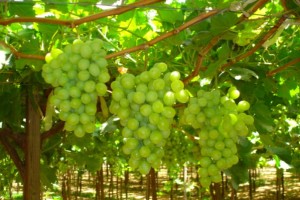I wrote this article for Zimbabwean farmers and entrepreneurs with specific interest in viticulture (grape farming) and those who are producing grapes for the first time. I felt there was a need to satiate the interest of enthusiasts of the vine and its products in Zimbabwe. There will be answers to a lot of questions about grapes in this article including answers to the questions why you should even bother grow grapes in Zimbabwe?
Grapes have so many uses and are so unique that no fruit can challenge their superiority. Thus they have a niche market of their own which they can’t compete with another plant in Zimbabwe and the world over. Methods of grape farming have transformed greatly over the past 20 years all over the world. Grapes are being produced in many places where it was not considered possible before, largely due to advances in understanding of how the vine works, as well as to improvements in technology and management skills.
Labor is a traditional limiting factor in grape production, but progress is being made to further mechanize production and harvesting. Mechanical harvesters have become the standard for wine and juice grapes and have even changed the way vines are trained because hand harvesting benefits from large clusters in well-defined areas, while for mechanical harvesters it doesn’t matter. Improvements in methods of pest control, with new application technologies and improved chemicals incurring reduced environmental impact, also help the bottom line. (G Creasy, L Creasy 2009)
Apart from the traditional use of a fresh eating fruit, the grape has various uses which include wine making, preserves, juice, and raisins. The fact that the grape is used for a great many products means that it will maintain steady market price all year round and thus Zimbabwean farmers need not worry about making losses due to stochastic horticulture produce prices.
Grape farming came to Africa when the Dutch first settled in South Africa around 1616 and then Zimbabwe in the preceding years. The grape grows when conditions are warm enough, but stops when temperatures fall below about 10°C. Unlike tree-fruits like apples which set a terminal bud as winter approaches, grapevines will continue to grow as long as conditions permit. The vine is highly adaptable to different environments which, in part, is why it is found growing in many and varied climates. Typically, at least in terms of commercial production, it is cultivated between the 10 and 20°C. This makes Zimbabwe a suitable environment for the natural growth of grapes. The good news for Zimbabwe is that grapes are now grown in many areas outside these boundaries due to identification of suitable mesoclimates and increased knowledge about their cultivation.
Just as the grapevine is highly adaptable to where and how it is grown, its fruit is also highly adaptable to different uses. Somewhat unique, the grape attains a high concentration of sugar when ripe, and also (depending on cultivar) pectin, as well as a wide range of aromatic compounds. These factors, in concentration with the presence of relatively high levels of acids (particularly tartaric acid), mean that the fruit is amenable to many different end uses. Grapes are mainly used for wine and related fermented products, with table grapes and raisins a distant second and third, respectively, in ranking (FAO, 2006).
As part of my research for this article, I have been buying the grape (fresh fruit) from different supermarkets in Harare for over 6 months and the minimum average price for 250 grams has been a consistent $5.00. I have spoken to procurement officers and Buyers from supermarkets and hotels casually and they assured me that the grape market is an underserved niche just like the mushroom niche. I haven’t written any article in a while and I didn’t want to just rush an article online without the proper facts in place. I know a lot of people out there will be interested in viticulture. At the moment, I haven’t found someone who knows the science of this plant enough to contact a training that will give value and profit to all the followers of ziminvestors.com. So training with us at the moment is out. I will only contact training when I find someone whose knowledge about this crop has wowed me like Aaron did with sack potato farming. Have a great week.
To your continued success





Would love to go into viticulture but where could one source grape seedlings in Zimbabwe ? Got my own water source and want to attempt a headlong approach to see feasibility in my region
I would say first talk to one of the bigger plant nurseries in towns like Byo or Harare. They need to be properly started or they will not bear the correct fruit for purpose.
Am in Bulawayo, want to buy grapevines for planting, even canes
Good work am a Kenyan end would like to try some of your grapes varieties.
I have long wondered why Zimbabwe does not grow more vines! The climate is excellent and vines prefer poorer soil so no intensive farming or fertilizers.
I have friends in Esigodini who have vines on their farm and have even dabbled in wine making.
Now is the time to take up this opportunity – it takes 7 years to get a decent harvest (perhaps this is the setback).
can you link to those that sell or grow grapes , your friends as you said mapitsem@yahoo.ca
I would like to grow grapes for personal consumption and would like to know where I can get the seeds. I plan to do that in July of 2018
I was a student at the University of Stellenbosch in 1969 when my mother, Virginia Whitfield, wrote me and asked that I get as much literature as I could concerning the growing of grapes as she had started planting grapes in Gweru (then Gwelo) in the Midlands. She wanted to supply grapes for the table. Through a student who was studying in the viticulture some senior lecturer passed me the message that my mother was bound for failure, but if she wanted to try in any event I should get her a copy of A J Winkler book “Viticulture”. I did so and she devoured the work and produced so much that some was left for bits of wine. In the end when she wanted to retire Distillers Corp in South Africa bought the farm and erected a winery on the property.
Interesting. I am investigating wine grape production in Zim.
Hie I am interested in starting grape farming here in Zimbabwe, if you got any info to help
Very helpful but where can I get the seedlings in harare
Comment
I’m interested in grape farming
Very inspiring , where can I get advice and seeds to grow in my backyard in Harare
2021 am growing grapes, I will keep researching and I will perfect everything as I go . But ain’t going back on my decision
im really interested in VITICULTURE..Anyone to tell me where i can find the Grapes i want to start the farming like NOW..Where cani find grapes nurseries
I am also interested in growing grapes anyone with information and how I can start please email on nyonielsee@gmail.com
please email us on invest@ziminvestors.com